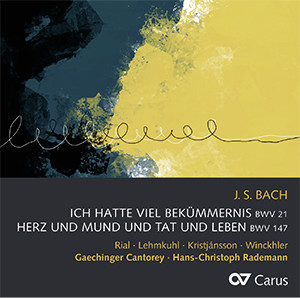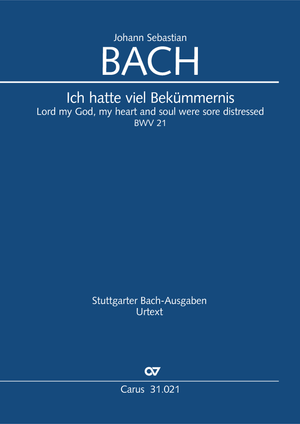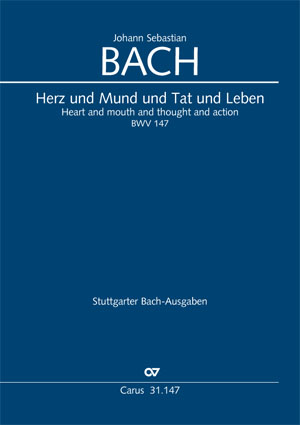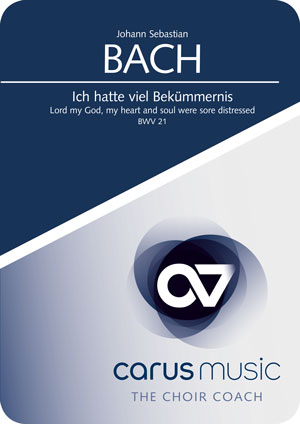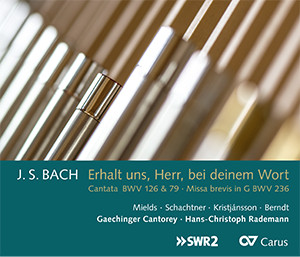Bach: Kantaten BWV 21 & 147
Hans-Christoph Rademann and the Gaechinger Cantorey, with an excellent ensemble of soloists around Núria Rial, Wiebke Lehmkuhl, Benedikt Kristjánsson and Matthias Winckhler, have once again selected works by probably Leipzig’s most famous Kantor of St. Thomas’ Church: Johann Sebastian Bach’s cantatas BWV 21 Ich hatte viel Bekümmernis and BWV 147 Herz und Mund und Tat und Leben. Two works whose origins lie in Bach’s Weimar period, but which Bach adapted and expanded for performances in Leipzig.
BWV 21 Ich hatte viel Bekümmernis is expressive also thanks to its unusual, almost – for Bach’s time – avant-garde opening chorus (“Ich, ich, ich, ich hatte viel Bekümmernis”), which earned Bach some criticism at the time, and its splendidly jubilant final chorus, which forms a wonderful parenthesis with the opening chorus of BWV 147.
Then there is BWV 147 with the splendid presence of the chorale arrangement (“Jesus bleibet meine Freude”) – a source of earworms – concluding both parts of the cantata: – this holds is so much emotional power and impact that one simply could not, and certainly cannot, remain unmoved, either then or today.
Sommaire
-
Compositeur
Johann Sebastian Bach
| 1685-1750Jean Sébastien Bach compte parmi les compositeurs essentiels de l'histoire de la musique occidentale. Il faisait partie d'une grande dynastie de musiciens, dont furent originaires nombre de musiciens municipaux et d'organistes dans les régions de Thuringe et de Saxe.
Bach vocal
Depuis la fondation des Éditions Carus en 1972, la publication des oeuvres de Johann Sebastian Bach revêt une importance particulière. En 2017, année du 500e anniversaire de la Réforme, nous avons clôturé le projet Bach vocal. L'intégralité de la musique vocale sacrée de Bach est désormais disponible en éditions modernes des textes originaux, matériel d'exécution compris. Une édition globale de toutes les partitions dans un coffret de grande qualité est aussi proposée. Plus d'information sur la personne
-
L'auteur de l'avant-propos
Henning Bey
| 1968
-
Ensemble
Gaechinger Cantorey
The Gaechinger Cantorey is the ensemble of the International Bach Academy Stuttgart. It combines a Baroque orchestra and a hand-picked choir to form a finely tuned early music ensemble. Under the baton of academy director Hans-Christoph Rademann, this ensemble is dedicated to the international dissemination of a “Stuttgart Bach style.” Since its re-establishment as the Gaechinger Cantorey in 2016, the ensemble of the International Bach Academy has gained renown with numerous performances in Germany, such as at the Musikfest Stuttgart, the Bachwoche Ansbach, the Bachfest Leipzig, the Rheingau Music Festival, the Festspielhaus Baden-Baden, the Dresden Kulturpalast, and the Hamburg Elbphilharmonie, as well as abroad at the Théâtre des Champs-Élysées in Paris, in the USA (Fort Lauderdale, Chapel Hill, Norfolk, Princeton, Los Angeles, Irvine, Williamsburg), in Canada (Montréal), and in South America (São Paulo, Rio de Janeiro, Buenos Aires, Lima, Santiago de Chile, Bogotá). In addition, the Gaechinger Cantorey with its director Hans-Christoph Rademann pursues a busy recording schedule. On the Stuttgart label Carus and on accentus music, the ensemble has recorded the Christmas Oratorio, cantatas and the two Passions by J.S. Bach, Handel’s Messiah, Haydn’s Creation and other works. Digital podcasts and concert streams with the Gaechinger Cantorey are also available in the Bach Academy’s media library. From May 2023 to June 2024, the Gaechinger Cantorey, under the direction of Hans-Christoph Rademann, will perform all J.S. Bach’s cantatas from his first year as Kantor at St. Thomas’s Church in Leipzig – exactly 300 years after the historic event in 1723/1724. CD recordings of all the concerts in churches and concert halls in Stuttgart and the surrounding area will be released by Hänssler Classic. The Gaechinger Cantorey regularly and enthusiastically participates in the various music education formats of the International Bach Academy under the motto “BachBewegt!,” in which children and young people are actively invited to sing, dance and experience music on stage or as listeners in the concert hall. These include family concerts, joint performances and danced interpretations of important masterpieces of the oratorio literature. Plus d'information sur la personne
-
Chef d'orchestre
Hans-Christoph Rademann
| 1965Conductor Hans-Christoph Rademann is an immensely versatile artist with a broad repertoire who devotes himself with equal passion and expertise both to the performance and rediscovery of early music and to the first performances and cultivation of Contemporary Music. Born in Dresden and raised in the Erzgebirge mountains, he was influenced at an early age by the great Central German kantorial and musical tradition. He was a student at the traditional Kreuzgymnasium, a member of the famous Kreuzchor, and studied choral and orchestral conducting at the Carl Maria von Weber University of Music in Dresden. During his studies, he founded the Dresdner Kammerchor and formed it into a top international choir which is still under his direction today. Since 2013, Hans-Christoph Rademann has been the academy director of the International Bach Academy Stuttgart. He regularly collaborates with leading choirs and ensembles of the international music scene. From 1999 to 2004 he was chief conductor of the NDR Choir and from 2007 to 2015 chief conductor of the RIAS Chamber Choir. Guest conducting engagements have led and continue to lead him to the Nederlandse Bachvereniging, the Collegium Vocale Gent, the Akademie für Alte Musik, the Freiburger Barockorchester, the Deutsche Radiophilharmonie Saarbrücken Kaiserslautern, the Sinfonieorchester Basel, the Orchestre Philharmonique de Luxembourg, among others. Hans-Christoph Rademann has been awarded prizes and honors for his artistic work, including the Johann Walter Plaque of the Saxon Music Council (2014), the Saxon Constitutional Medal (2008), the Sponsorship Prize as well as the Art Prize of the state capital Dresden (1994 and 2014 respectively). He received the Preis der Deutschen Schallplattenkritik several times for his numerous CD recordings (most recently in 2016), as well as the Grand Prix du Disque (2002), the Diapason d’Or (2006 & 2011), the CHOC de l’année 2011 and the Best Baroque Vocal Award 2014. In 2016 he was awarded the European Church Music Prize of the city of Schwäbisch Gmünd. His exemplary interpretation and recording of the complete works of Heinrich Schütz with the Dresdner Kammerchor in the Stuttgart Carus-Verlag, which was completed in 2019, was awarded the newly endowed Heinrich Schütz Prize as well as the OPUS KLASSIK 2020 in the same year. Hans-Christoph Rademann is professor of choral conducting at the Carl Maria von Weber University of Music in Dresden. He is also artistic director of the Musikfest Erzgebirge, ambassador of the Erzgebirge and patron of the Christian Hospice Service Dresden. Plus d'information sur la personne
-
Solist - soprano
Núria Rial
-
Solist - alto
Wiebke Lehmkuhl
-
Solist - ténor
Benedikt Kristjánsson
-
Solist - basse
Matthias Winckhler
Critiques
...munter, klar, mit raffinierten polyfonen Reibungen zwischen zwei Ebenen und mit einem Text, der nach den Tränen Sehnen, Not und Tod des CD-Beginns eine Tür aufstört zu Wonne, Sonne, Saft und Kraft.
Stuttgarter Zeitung, Ocktober 2021
Die Stimmen der Choristen sind klanglich wohl ausbalanciert und fügen sich zu einem sehr natürlichen Ensembleklang. Die Instrumentalisten der Bach-erprobten Gaechinger Cantorey setzen...nicht nur klangschöne Akzente, sondern auch unterstützen die Sänger bei ihren Text- und Affektausdehnungen, ohne sich in den Vordergrund zu drängen.
Bachmitteilungsblatt, 39/2022
In der Summe eine ungemein gediegen gesungene und gespielte Platte mit Bach-Kantaten.
Klassik.com
... Die vorgelegte Sensibilität und Dichte im Klang einerseits und die Spritzigkeit in den «Cori» andererseits sind ungemein beflügelnd.
Die zweite hier dokumentierte Kantate … gibt ebenso ein lively, clear, with refined polyphonic frictions between two levels and with a text that, after the tears longing, distress and death of the CD beginning, opens a door to delight, sun, juice and power.
hervorragendes Beispiel der Arbeit der Gaechinger Cantorey ab, die in punkto Bach-Rezeption zu den besten Ensembles der Republik zählt.
Manuel Stangorra, Chorzeit, Nov. 2021
... Der Orchesterklang ist in Rademanns Aufnahme sehr transparent und höchst ausgeglichen eingefangen.
Fazit: Welch ein Glück, innerhalb von ein paar Wochen zwei derartig hervorragende Aufnahmen dieser grandiosen Kantate hören und vergleichen zu können!
Gustav Danzinger, CHOR aktuell, 4/2021
... Das für Bach-Verhältnisse üppige Orchester bleibt durchsichtig, spielt warm im Klang und leichtfüßig im Gestus. Der Chor …. vermittelt schlanke, schwingende Linien. Die freudigen Teile kommen pulsierend luftig, die innigen Teile beseelt. Die Fugenteile wiederum wirken atmend und organisch.
Reutlinger Generalanzeiger, 03.11.2021
Questions fréquentes sur l'œuvre
 Il n'y a pas encore de questions et réponses concernant cette œuvre ou vous n'avez pas trouvé la réponse à votre question sur l'œuvre ? Cliquez ici et envoyez votre question spécifique à notre service clients.
Il n'y a pas encore de questions et réponses concernant cette œuvre ou vous n'avez pas trouvé la réponse à votre question sur l'œuvre ? Cliquez ici et envoyez votre question spécifique à notre service clients.


